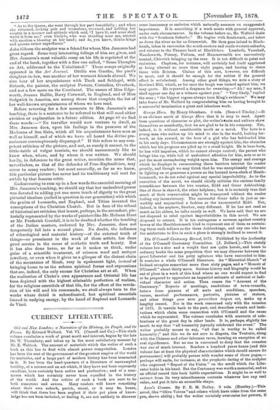George How. By Henry Glembam. 3 vole. (Samuel Tinsley.)—It is
an obvious merit of George Hem that it is easy to read. Apart from questions of character or plot, the writer's taste and culture show themselves so manifestly, that we are glad to be in his company. Nor, indeed, is it without considerable merit as a noveL The hero is a young man who makes up his mind to rise in the world, looking for- ward, as his reward, to the love of a girl who has befriended him in his early dap. Circumstances are strongly against him, the obstacles which bar his progress are piled up to a cruel height. He is base-born, he has wild impulses, which he cannot always control ; the parent who brings him up, while full of undoubted affection for him, acts so as to put the most encumbering weight upon him. The energy and courage which he displays in surmounting these barriers interest the reader greatly, and though wo may think that he was exceptionally fortunate in lighting on so generous a person as the learned town-clerk of Heath- hammock, we do not rebel against any special improbability. As to the execution of the novel, we should chiefly criticise the carious family resemblance between the two cousins, Kidd and Oscar Ashbocking.. One of these is shrewd, the other helpless; but it is certainly true that much of their conversation might be transposed without the reader feeling any inconsistency. The successful Oscar talks in just as un- worldly and unpractical a fashion as the unsuccessful Kidd. Nor, indeed, is the nephew, Storker, very different. If he has not read as much as his elders, he talks nearly as well. We have said that we are not disposed to rebel against improbabilities in this novel. We are disposed to retract. It is too outrageous a sarcasm against country towns of the Heathhammock kind to represent one of them as contain- ing three such talkers as the throe Ashbockings, and any one who has the misfortune to live in such a place is strongly inclined to resent it.


































 Previous page
Previous page